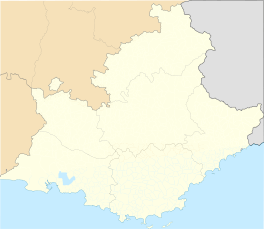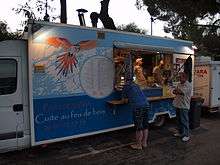Vence
| Vence | ||
|---|---|---|
|
View of Vence. In the background, the Mediterranean Sea. | ||
| ||
 Vence | ||
|
Location within Provence-A.-C.d'A. region  Vence | ||
| Coordinates: 43°43′25″N 7°06′51″E / 43.7236°N 7.1142°ECoordinates: 43°43′25″N 7°06′51″E / 43.7236°N 7.1142°E | ||
| Country | France | |
| Region | Provence-Alpes-Côte d'Azur | |
| Department | Alpes-Maritimes | |
| Arrondissement | Grasse | |
| Canton | Vence | |
| Intercommunality | Nice-Côte d'Azur | |
| Government | ||
| • Mayor (2008–2014) | Régis Lebigre (PR) | |
| Area1 | 39.23 km2 (15.15 sq mi) | |
| Population (2012)2 | 19,241 | |
| • Density | 490/km2 (1,300/sq mi) | |
| Time zone | CET (UTC+1) | |
| • Summer (DST) | CEST (UTC+2) | |
| INSEE/Postal code | 06157 / 06140 | |
| Elevation |
40–1,033 m (131–3,389 ft) (avg. 325 m or 1,066 ft) | |
|
1 French Land Register data, which excludes lakes, ponds, glaciers > 1 km² (0.386 sq mi or 247 acres) and river estuaries. 2 Population without double counting: residents of multiple communes (e.g., students and military personnel) only counted once. | ||
Vence is a commune set in the hills of the Alpes Maritimes department in the Provence-Alpes-Côte d'Azur region in southeastern France between Nice and Antibes.
Population
| Historical population | ||
|---|---|---|
| Year | Pop. | ±% |
| 1793 | 2,615 | — |
| 1800 | 2,657 | +1.6% |
| 1806 | 3,020 | +13.7% |
| 1821 | 3,045 | +0.8% |
| 1831 | 3,612 | +18.6% |
| 1836 | 3,156 | −12.6% |
| 1841 | 3,165 | +0.3% |
| 1846 | 3,101 | −2.0% |
| 1851 | 2,974 | −4.1% |
| 1856 | 2,733 | −8.1% |
| 1861 | 2,710 | −0.8% |
| 1866 | 2,755 | +1.7% |
| 1872 | 2,828 | +2.6% |
| 1876 | 2,770 | −2.1% |
| 1881 | 2,761 | −0.3% |
| 1886 | 2,903 | +5.1% |
| 1891 | 3,103 | +6.9% |
| 1896 | 3,043 | −1.9% |
| 1901 | 3,124 | +2.7% |
| 1906 | 3,208 | +2.7% |
| 1911 | 3,498 | +9.0% |
| 1921 | 3,090 | −11.7% |
| 1926 | 4,192 | +35.7% |
| 1931 | 4,876 | +16.3% |
| 1936 | 5,495 | +12.7% |
| 1946 | 5,685 | +3.5% |
| 1954 | 6,278 | +10.4% |
| 1962 | 7,874 | +25.4% |
| 1968 | 9,420 | +19.6% |
| 1975 | 11,385 | +20.9% |
| 1982 | 13,119 | +15.2% |
| 1990 | 15,330 | +16.9% |
| 1999 | 16,982 | +10.8% |
| 2008 | 19,247 | +13.3% |
| 2010 | 19,281 | +0.2% |
| 2012 | 19,241 | −0.2% |
Sights
Within the historic village, a medieval walled village, there are numerous interesting sights and monuments. The Peyra Gate was remodelled in 1810. The fountain was rebuilt in 1822 replacing an older one dating from 1578. Nearby is an oak, donated by François I and planted in 1538. The castle is today the Fondation Émile Hugues, a modern and contemporary art museum. The cathedral was built in the 4th century on the site of a Roman temple. The stone of the western façade dates from 239. Another, on the right, was engraved in December 220. Other stones in the external walls represent funerary dedications. Also on the western side of the church, the Pierre du Tauroble evokes the cult of Cybele and also the Great mother of the Gods of Mount Ida. A chapel in the cathedral has a mosaic by Marc Chagall, dated 1911. The rue des Portiques is a section of the old Roman road.[1]
The town has a small chapel, up above the Cité Historique Chapelle du Rosaire (1948, completed in 1951), decorated with stained glass and other fittings by Henri Matisse, who owned a home in the village towards the end of his life.
Vence is famous for its spring water, which can be collected from numerous fountains in the town.
International relations
Vence is twinned with the market town of Stamford, Lincolnshire.
Personalities
- D.H. Lawrence (1885–1930), writer, born in Eastwood, UK and died in Vence.
- James Baldwin (writer) died in the nearby St Paul de Vence
- Maurice Boitel (1919–2007), artist
- Henri Calet (1904–1956), writer
- Marc Chagall, artist
- Edward Gordon Craig (1872–1966), theatre practitioner, actor, producer, director and scenic designer died here
- Jean Vincent de Crozals (1922-2009), artist
- Émile Delavenay (1901–2003), anglicist
- Raoul Dufy, artist
- Célestin Freinet, French educator, who established his school in Vence
- Witold Gombrowicz (1904–1969), writer, died in his home here
- Mihály Károlyi (1875–1955), Hungarian leader
- Henri Matisse (1869–1954), artist
- Jacques (artist) and Gwen Raverat (artist and writer)
- Ida Rubinstein, ballerina
- Émile Hugues (1901-1966), politician, was born in Vence. The art museum is named after him.
- Jacques Morali (1947-1991), Disco music author (Village People, YMCA), born in Paris and buried in Vence.
Ecclesiastical history
The first known Bishop of Vence is Severus, bishop in 439 and perhaps as early as 419.
Among others are: St. Veranus, son of St. Eucherius, Archbishop of Lyon and a monk of Lérins, bishop before 451 and at least until 465; St. Lambert, first a Benedictine monk (died 1154); Cardinal Alessandro Farnese (1505–11).
Antoine Godeau, Bishop of Grasse, was named Bishop of Vence in 1638; the Holy See wished to unite the two dioceses. Meeting with opposition from the chapter and the clergy of Vence Godeau left Grasse in 1653, to remain Bishop of Vence, which see he held until 1672.
The diocese of Nice now unites the three former Dioceses of Nice, Grasse and Vence.

Education
Nursery schools
- École Maternelle lei bigaradie
- École Maternelle du Signadour
- École Maternelle de l'ouest
Primary schools
- École primaire du Suve
- École primaire Saint-Michel
- École primaire Toreille
- École primaire Chagall
- École Célestin Freinet
Grammar school
- Collège La Sine
High school
- Lycée Henri Matisse.
See also
References
- INSEE
-
 This article incorporates text from a publication now in the public domain: Herbermann, Charles, ed. (1913). "article name needed". Catholic Encyclopedia. New York: Robert Appleton.
This article incorporates text from a publication now in the public domain: Herbermann, Charles, ed. (1913). "article name needed". Catholic Encyclopedia. New York: Robert Appleton.
- ↑ Itinéraire découverte de la Cité Historique, Office de Tourisme de Vence 2011
External links
| Wikimedia Commons has media related to Vence. |
-
 Vence travel guide from Wikivoyage
Vence travel guide from Wikivoyage - Pictures of Vence Cathedral: ,
- French language Wikipedia Article about Henri Calet
- French language Wikipedia Article about Émile Delavenay

.svg.png)